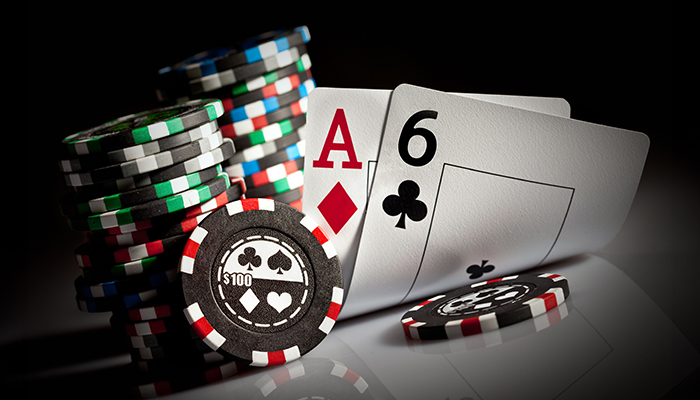What Is a Soft 17 in Blackjack?
 Soft 17 in Blackjack
Soft 17 in Blackjack
In blackjack, all of the card values are those marked on the card, with all face value cards, Jack, Queen, and King, being worth ten points, just like the ten value cards. The goal is to have a hand higher than the dealer without going over 21. If you go over 21, you bust and lose automatically.
The problem comes in with the Ace. According to blackjack rules, the Ace can be worth either one or eleven. So, a hand of ace/six could be worth seven or seventeen. This is a soft 17 in blackjack. We call these soft hands, meaning you can hit them again without breaking them.
For instance, if you hit your hand with a ten, you now have no choice but to count the Ace as only 1. Your hands would total a hard 17, meaning to hit again might break your hand.
What to Do With a Soft 17?
The golden rule here is that we are never going to stand on a soft seventeen; we will always hit or double. Remember that if you are counting the Ace as an eleven, then that is still a soft hand, so if you have ace/three and draw another three, you still only have soft seventeen, but since it’s no longer your first two cards, you can no longer double.
We will hit soft 17 if a dealer has a seven, eight, nine, or ten-up card because we assume the dealer will have a ten-card tucked under, either tying or beating our hand. We also hit a soft seventeen against a two and an ace dealer up card. In this case, the dealer is likely to draw a strong hand when starting with either of these two lower starting cards.
If the dealer shows either a three, four, five, or six-up card, then we wish to double. Doubling down is allowed on your first two cards and lets you bet an additional bet up to your initial wager, but in return you receive only one card and can’t draw any more regardless of the card you draw.
We double down against these up cards because we believe that either we will receive a ten, giving us a hard seventeen and that the dealer will then bust, or we hope for an ace through five cards that still improve our hand to better than 17. That still leaves four cards that we might draw that would make our hand worse, but the dealer still may bust, so doubling down is a chance worth taking.
Is It Bad When Your Blackjack Dealer Hits Soft 17?
Some casinos have their dealer hit soft seventeen, and some don’t. It will be clearly posted on the table layout you are playing. If you play blackjack online you will find most games stand on soft seventeen. If the dealer stands on soft 17, that is .22% better in terms of basic strategy house advantage. So, when possible, look for games where the dealer stands on soft 17.
Games marked on the layout with “Dealer Hits Soft 17” are slightly more disadvantageous to the player, much as when it was our turn to hit soft seventeen, the dealer has the ten, jack, queen, and king which will give them hard 17. They then have the Ace, two, three, four, or five that will improve their hand all the way up to twenty-one.
The six, seven, eight, or nine does decrease their hand but gives them a chance to draw yet again, and that still leaves them as many as eight or as few as five cards that will help them improve their hand without busting.
Conclusion
So, when faced with an ace and a six, our blackjack soft seventeen strategy is simple and effective. If the dealer has three, four, five, or six-up cards, we double down. Otherwise, we hit. This is what the math behind the basic strategy chart tells us is best over many thousands of soft seventeens. It may not work every time, but it will work over time.
If you have a three or more-card soft seventeen, you should always take the free hit. Then, use the basic strategy cart to tell you whether to stand or hit again based on your hard-hand total. Remember, you can’t double after the first two cards.
When choosing blackjack games, we prefer those that say, “Dealer Stands on Soft 17”. They may only have a .22% percent advantage over games where the dealer hit soft seventeen. Still, when you are talking about a game that only generally has a few tenths of a percent in the house’s favor to start, you may be effectively doubling the house advantage against you by playing on a table that hits soft seventeen.




